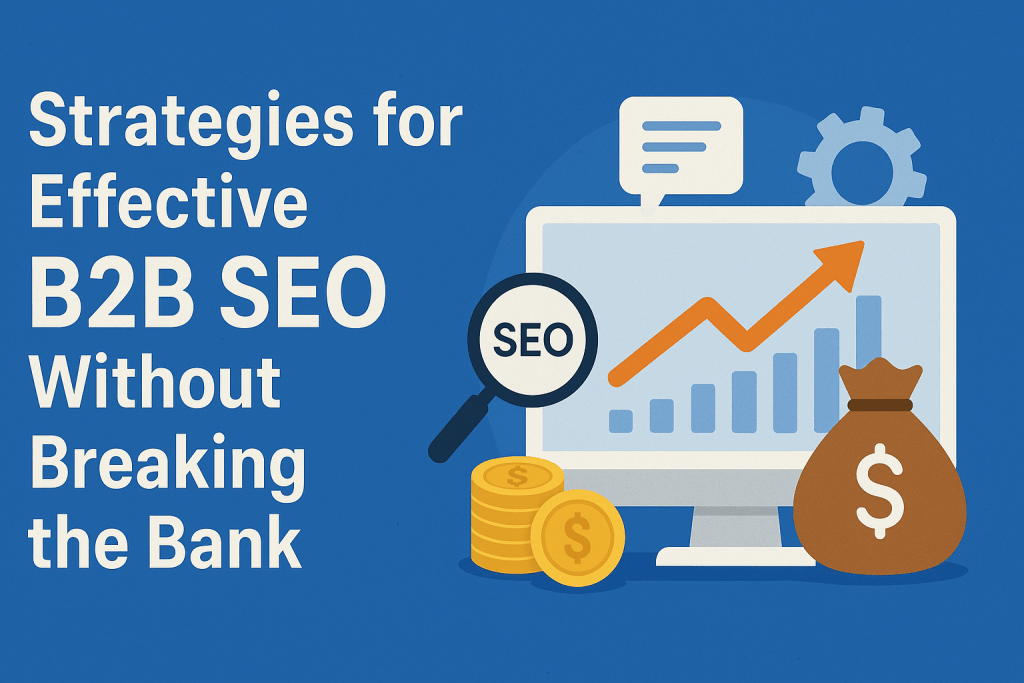Table of Contents
- Introduction to B2B SEO
- Understanding Your Audience
- Choosing the Right Keywords
- Building Quality Backlinks
- Optimizing On-Page Elements
- Tracking SEO Performance
- Utilizing Cost-Effective Tools
- Staying Updated with SEO Trends
In today’s fast-evolving marketing landscape, a robust online presence has morphed from a luxury into a necessity for businesses eyeing growth and expansion. B2B companies, in particular, are increasingly adopting Search Engine Optimization (SEO) to bolster their digital visibility. By crafting an intelligent B2B SEO strategy, businesses can significantly enhance their digital footprint, often surpassing the effectiveness of traditional marketing tactics without depleting financial resources.
The core strength of an impactful B2B SEO strategy lies in understanding its multifaceted nature and intricate nuances. This guide sheds light on cost-effective strategies that promise long-term success, ensuring businesses—irrespective of size—can compete effectively in the digital realm. Focusing on sustainable and pragmatic SEO practices provides visibility and enhances business growth on multiple fronts.

Introduction to B2B SEO
B2B SEO is a sophisticated discipline centered around optimizing a company’s online presence to attract the attention of other businesses. Unlike B2C SEO, which targets the general consumer base, B2B SEO requires a well-tailored approach, considering the complex nature of business transactions, elongated sales cycles, and interactions within niche markets.
Marketing to decision-makers presents distinct challenges, necessitating a carefully crafted communication strategy. This requires a deeper understanding of specific industry jargon, professional pain points, and organizational goals to craft content that attracts and converts these key stakeholders into clients. For many businesses, mastering these intricacies is where the challenge—and opportunity—of B2B SEO truly lies.
Understanding Your Audience
The success of any B2B SEO strategy rests heavily on a profound understanding of its target audience. Recognizing who your audience is, including their preferred communication channels and decision-making criteria, sets the foundation for effective engagement. Such an understanding allows for creating content that speaks directly to the audience, addressing their unique needs and challenges while building credibility and trust.
Audience segmentation is a powerful tool in this context. You can craft highly personalized marketing campaigns by segmenting your audience based on industry verticals, company size, and decision-maker roles. Gathering insights through comprehensive market research—utilizing methods like surveys, face-to-face interviews, and social listening—equips businesses with the knowledge to anticipate and respond effectively to market demands.
Choosing the Right Keywords
Keywords are the lifeblood of SEO, serving as the primary conduit through which potential leads are funneled to your website. In B2B SEO, choosing the right keywords involves identifying industry-specific terms potential clients might use to discover your business. This necessitates a detailed keyword research process to uncover high-value keywords that align with your business objectives.
By leveraging tools like Google Keyword Planner and SEMrush, businesses can uncover insights into search volume, competition, and keyword performance. As emphasized in keyword planning resources, the emphasis on long-tail keywords cannot be overstated—they often capture more precise search intents, leading to higher conversion rates by attracting more qualified traffic.
Building Quality Backlinks
Backlinks are a testament to your site’s credibility in the eyes of search engines, akin to votes of confidence from other websites. Gaining backlinks from reputable sources can dramatically enhance your site’s authority and visibility. This makes cultivating a strong backlink profile an imperative part of any effective B2B SEO strategy.
Several innovative strategies exist for acquiring high-quality backlinks: writing guest posts on respected industry platforms, participating in joint ventures with market leaders, and forming alliances with complementary businesses. Additionally, crafting informative and valuable content increases the likelihood of being referenced by other sites, thus organically boosting your backlink portfolio and signaling trustworthiness to search engines.
Optimizing On-Page Elements
On-page SEO ensures that each page communicates relevance and value to visitors and search engines. Core elements such as title tags, headers, metadata, and alt texts must be meticulously crafted to optimize search engine performance. Incorporating relevant keywords while maintaining a natural flow is crucial to balancing optimization with user experience.
With effective on-page optimization techniques, businesses can enhance search engine rankings while offering users a seamless navigation experience. Quality on-page SEO demonstrates a clear value proposition to visitors, effectively answering their queries and engaging them on a meaningful level, thereby fueling conversions and revenue growth.
Tracking SEO Performance
Monitoring SEO performance is crucial to gain insights into the effectiveness of your strategies. By consistently monitoring essential performance metrics—such as natural traffic, exit rates, and conversion rates—companies can enhance their strategies, recognize areas of achievement, and expand upon them to improve their overall tactics.
Resources like Google Analytics and Moz provide firms with extensive analytical tools. These platforms enable organizations to base their choices on data, guaranteeing that SEO initiatives align with broader business goals. The cycle of measuring, analyzing, and optimizing should be an ongoing process to sustain business growth in the ever-evolving digital landscape.
Utilizing Cost-Effective Tools
Achieving SEO success doesn’t necessitate a steep investment. Many free and affordable tools offer excellent features for keyword research, competitor analysis, and performance tracking. Tools like Google Search Console and Ubersuggest provide invaluable data that fuels effective optimization strategies at minimal cost.
These digital tools democratize access to SEO insights, allowing businesses of varying sizes and budgets to compete effectively. By efficiently harnessing these tools, companies can maintain a competitive edge, ensuring that their SEO strategies drive meaningful results without incurring substantial expenses.
Staying Updated with SEO Trends
In the ever-changing landscape of SEO, it is essential to keep up with the newest trends and updates to stay strategically relevant. Algorithms change, user search patterns vary, and innovative technologies arise—each influencing the method of executing and strategizing SEO.
To lead in the SEO space, organizations should connect with industry experts, follow credible SEO news outlets, and participate in webinars and discussions. Ongoing education and adjusting to fresh trends ensure your strategies stay innovative, allowing your company to gain and maintain a competitive upper hand online.

